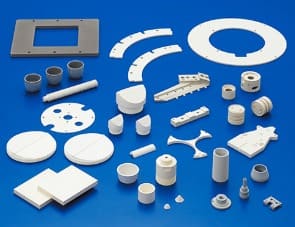Machinable Ceramics: Key Properties for Industrial Applications
Introduction
Machinable ceramics are advanced glass-ceramics designed for precision applications across industries. Known for their ease of machining, excellent insulation, and thermal shock resistance, these materials are ideal for demanding environments in electronics, aerospace, and medical sectors. Customizable options include materials like alumina, zirconia, toughened zirconia, aluminum nitride, silicon nitride, silicon carbide, and titanium dioxide, catering to diverse industrial needs. This article details the key properties of machinable ceramics, supported by a comprehensive table, to highlight their suitability for industrial use.
Properties of Machinable Ceramics
Machinable ceramics, such as MACOR, offer a unique combination of mechanical, thermal, and electrical properties. Below are their primary characteristics:
- Ease of Machining: Can be shaped using standard metalworking tools, enabling complex designs.
- Excellent Insulation: High dielectric strength and volume resistivity ensure reliable electrical insulation.
- Thermal Shock Resistance: Maintains stability under temperature fluctuations, suitable for thermal management applications.
- Mechanical Strength: Provides sufficient strength for precision components with good elasticity.
- Low Thermal Conductivity: Acts as an effective thermal insulator, protecting components in high-temperature environments.
Detailed Properties Table
The table below provides a detailed overview of machinable ceramics’ properties, focusing on mechanical, thermal, and electrical characteristics.
| Property | Value |
| Main Characteristics | |
| Color | White |
| Main Characteristics | Easy to machine, excellent insulation, good thermal shock resistance |
| Main Applications | Precision parts, insulating parts |
| Mechanical Properties | |
| Bulk Density (g/cm³) | 2.52 |
| Water Absorption (%) | 0 |
| Vickers Hardness (GPa, Load 500g) | — |
| Flexural Strength (MPa) | 94 |
| Compressive Strength (MPa) | 345 |
| Young’s Modulus (GPa) | 25.5 |
| Poisson’s Ratio | 0.29 |
| Fracture Toughness (MPa m¹/²) | — |
| Thermal Properties | |
| Coefficient of Thermal Expansion (×10⁻⁶/°C, 40–400°C) | 9.0 |
| Thermal Conductivity (W/mK, 20°C) | 1.46 |
| Specific Heat Capacity (J/(kg·K) × 10³) | 0.79 |
| Thermal Shock Resistance (ΔT°C) | — |
| Electrical Properties | |
| Volume Resistivity (ohm-cm, 20°C) | >10¹⁷ |
| Dielectric Strength (kV/mm) | 45 |
| Dielectric Constant (1 MHz) | 6.01 |
| Dielectric Loss Tangent (×10⁻⁴) | 4 |
| Chemical Properties | |
| Nitric Acid (60%) Weight Loss (mg/cm²/day) | — |
| Sulfuric Acid (95%) Weight Loss (mg/cm²/day) | — |
| Caustic Soda (30%) Weight Loss (mg/cm²/day) | — |
Table Notes:
- Mechanical Strength: Flexural strength (94 MPa) and compressive strength (345 MPa) ensure suitability for precision components.
- Thermal Insulation: Low thermal conductivity (1.46 W/mK) supports thermal management applications.
- Electrical Insulation: High volume resistivity (>10¹⁷ ohm-cm) and dielectric strength (45 kV/mm) ensure reliability in electronic applications.
Conclusion
Machinable ceramics offer a unique combination of ease of machining, excellent insulation, and thermal shock resistance, making them ideal for precision parts and insulating components in industries such as electronics, aerospace, and manufacturing. Customizable materials like alumina, zirconia, toughened zirconia, aluminum nitride, silicon nitride, silicon carbide, and titanium dioxide provide tailored solutions for specific applications.
Advanced Ceramics Hub is a leading manufacturer and supplier of high-quality machinable ceramic products in the form of plates, sheets, rods, tubes, crucibles, substrates, and customized parts, offering customized solutions for various industrial and research applications.

